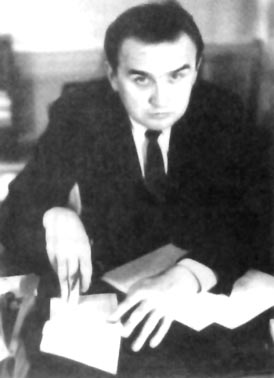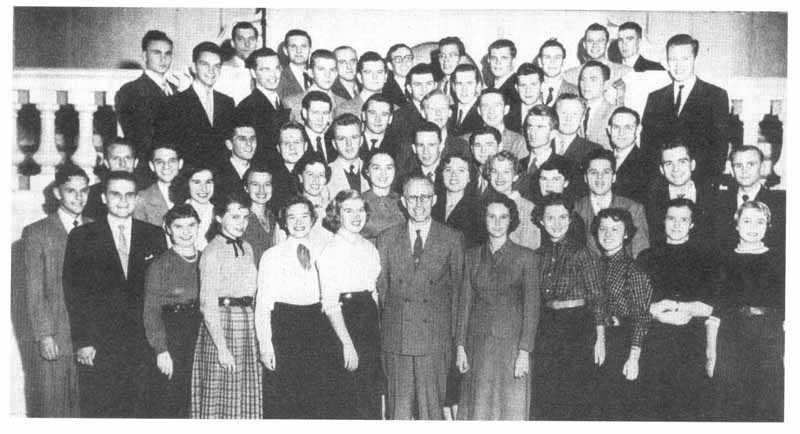Editor of this issue: Arvydas Tamulis
Copyright © 2004 LITUANUS Foundation, Inc.

|
LITUANUS
LITHUANIAN QUARTERLY JOURNAL OF ARTS AND SCIENCES
Volume 50, No.5 - 50 Year Anniversary Issue 2004
Editor of this issue: Arvydas Tamulis ISSN 0024-5089 Copyright © 2004 LITUANUS Foundation, Inc. |

|
PRESENT AT THE CREATION
ANTANAS V. DUNDZILA
 |
|
Vytautas Vygantas, |
For the fiftieth anniversary issue of Lituanus, we have borrowed the title of a book by former U.S. Secretary of State, Dean Acheson. We do so without the intent to appear pompous, nor do we invoke parallels between Secretary Acheson and ourselves. From our own micro-world, we simply recollect the birth of a publication in what would appear, in any lifetime, a distant past. Any periodical that has served its readership and enjoyed the support of a community for that long has something germane to offer. A major anniversary is the right moment to reflect on the circumstances and key individuals that were present at its creation.
A brush stroke on the social environment of the Lithuanian ethnic minority in the U. S. circa 1948-1950 will set the stage. World War II had ended in 1945 and due to a change in U.S. immigration laws there was a sizeable influx - some 30,000 strong - of Lithuanian immigrants to America, where they found a lively population of organized compatriots from the prewar decades. The new settlers were proud of their Lithuanian heritage and conscious of their national identity. They were civic-minded, staunchly anti-communist, and, among other things, valued a higher education. It was a given that a college-age son or daughter would strive for a college or university degree. As a result, the Lithuanian Student Association (LSA) was chartered in 1951. In 1954, its membership stood at 569, with chapters on at least a dozen campuses - and the "golden" years of the LSA were yet to come: in 1957, the association had 22 chapters and 743 members, most of them full-time students! The LSA was an active, vibrant organization; in its 1955 general election, for example, 72 percent of its members voted. And yet, financially, the association was poor: the records show that the LSA Executive Council's treasury in 1952 contained $35.10. Chapters operated on a shoestring, and membership dues never exceeded a few dollars. Many students held part-time jobs; military veterans studied and subsisted on their G.I. Bill benefits. (To put prices in perspective, at the University of Illinois, full-time undergraduate tuition for the 1955 spring semester cost seventy-nine dollars, a first-class postage stamp only three cents, one gallon of gas around twenty cents, etc.) Enter, in 1954, Vytautas P. Vygantas (1930-1998), a University of Illinois Ph.D. candidate in industrial psychology: the promoter behind the idea, actually the founder, of Lituanus.

University of Illinois Lithuanian Students' Society in Champaign-Urbana in 1955
By the summer of 1954, I had completed my junior year at University of Illinois Urbana campus. At that time, there was a tightly knit group of forty or so Lithuanians on campus, not an unusual showing, since University of Illinois was "home" for many Chicago area residents. Early that summer, Vygantas, whom I knew from Urbana the year before, unexpectedly paid me a visit in Chicago. He was a member of the recently elected LSA Executive Council that was ready to implement his proposal to launch an English-language bulletin, a quarterly
Vygantas asked me to take the lead in organizing an editorial board from our Urbana-based friends and to lay the groundwork for immediate issues during the coming academic year. The thrust of the publication was on current Lithuanian topics for a non-Lithuanian readership. Having already arranged some of the necessary preliminaries, his proposal had already been approved by the LSA Executive Council. The initial press run would be under a thousand copies, slated specifically for student organizations and college libraries both here and abroad. The bulletin would be printed and expedited in Brooklyn, NY, at the print shop of the Lithuanian weekly Darbininkas. Some financial support would come from the Lithuanian-American civic leader and philanthropist Joseph J. Bachunas (1893-1969), who had seeded the idea at some LSA gatherings and promised his assistance. I was to sign up the editorial board members, come up with a plan, work out related details, etc.
The next time Vygantas and I met in Chicago, I was ready with the make-up of the editorial board. It consisted of the author, plus Kęstutis A. Mikėnas, Algis Pabarčius, Dalilė Valančiūtė (Polikaitienė), and member ex-officio Vygantas. From several proposed titles, we agreed upon my suggestion, "Lituanus," which means "The Lithuanian" in Latin. I had a draft editorial statement for Issue No. 1, which was subsequently edited by the staff of the Chicago Lithuanian radio program "Margutis." We settled on proposed articles and authors for the year. Vygantas made the point that I should visit Mr. Bachunas; the Lithuanian Consul in Chicago, Dr. Petras P. Daužvardis (1895-1971); and several other Lithuanian-American civic leaders, for we youngish students felt it only proper to apprise our community elders of our plans.
The meeting with Mr. Bachunas was short and sweet. Pabarčius and I met him at his commercial resort in Sodus, Michigan. Comfortably seated on the lawn, we outlined our plans, and asked him if he had any suggestions and if he would be willing to support such a publication. His answer was short and affirmative, and he did not have any suggestions. He then invited us to his restaurant for lunch. Dr. and Mrs. Daužvardis then received me at their residence, which, because of austerity measures, also served as the consular office. Both of them endorsed our plans most enthusiastically. Dr. Daužvardis then turned the conversation to Lithuanian student life at Urbana. After that meeting, both of them would recognize me at various Lithuanian functions, always greeting me warmly. I also paid visits to the two Chicago Lithuanian daily newspaper editors and powerhouses in our civic affairs, Messrs. Leonardas Šimutis (1892-1975) and Pijus Grigaitis (1883-1969), as well as several other individuals.
By the end of September 1954, we had all the manuscripts for the first issue in hand. There was hardly any need for editorial perusal, since our authors were either big names in the community or student friends, competent within their respective topics. Thus our editorial efforts were mainly centered on style and English grammar. We paid a University of Illinois English major for a technical edit. Otherwise, all our efforts were gratis, including postage stamps. It was a volunteer, civic activity par excellence. Vygantas forwarded final versions of the manuscripts to Brooklyn.
The LSA convened its annual meeting in Chicago during Thanksgiving vacation, late in November 1954. This was the time and place where the inaugural issue of Lituanus made its debut. The publication looked neat and inviting, thanks to the Brooklyn staff, although it ran only twelve 8-1/2 x 11 inch pages in all. The meeting's participants praised our product. A member of the previous LSA Executive Council publicly endorsed it and regretted that past LSA administrations had not picked up on the project. Our Lithuanian press was equally positive, unanimous. We were off to a great start! In March 1955, for Issue No. 2, we increased the press run from 900 to 1,200. In July, we came out with a twenty-four-page double issue, No. 3-4, and, in terms of the number of pages, never went back. I received my bachelor's degree in engineering in June of 1955 and left the campus for good. Subsequently, the editorial board was infused with talented, Urbana-based individuals, more appropriately majoring in political science and related fields. Vygantas continued in various editorial capacities through the Fall of 1963, long after earning his Ph.D. in 1956. His contributions to the Lituanus legacy are solid.
The record shows that Lituanus rapidly became an institution. The LSA faded from the picture in 1963, and the nonprofit Lituanus Foundation was incorporated to shepherd the popular quarterly on a long-term basis. Like all publications that remain relevant, it had to evolve. It did evolve into a broader academic review on Lithuania and topics pertaining to the Baltic area. It scored some major accomplishments, which is a separate topic.
Neither in 1954, nor much later, during years of various operational, organizational, or financial adaptations, had I ever contemplated the possible life expectancy of Lituanus. Facing its fiftieth anniversary today, I sense surprise and joy. I see Lituanus clearly poised to continue. Lithuania is independent and strong again, a member of NATO and the EU. This is what Lituanus aspired to, along with other goals, in 1954. With a warm respect for numerous Lituanus editors, supporters, volunteers and former colleagues, I have shared some of the youthful steps that started this publication on its initial - and today I certainly believe it to be "initial" - fifty-year journey.